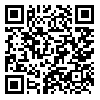Volume 9, Issue 18 (2023)
QHTS 2023, 9(18): 34-64 |
Back to browse issues page
1- Imam Khomeini International University , aliasghar.shahbazi@gmail.com
2- Imam Khomeini International University,
2- Imam Khomeini International University,
Abstract: (1112 Views)
The element of dialogue is one of the main ways to spread the story and image of the characteristics and representation of situations. In the Holy Qur'an verses, dialogues, especially in the Qur'anic stories have a prominent and frequent place. One of the prominent features of these conversations is the crystallization of personalities various tones, which is based on the arrangement quality of words, signifying the rhetorical elements of the sentence, favor (Iltifāt) and other phonetic ultimatums and techniques formed and indicating the distinctive speech style of each character. The revival of this feature in translation language requires attention to the capacities of the target language and all elements of the word style-making so that the diversity of the characters and the dialogue style and tone of the characters in the target language are represented. The present study aimed to analyze the translator's strategies in conveying Quranic address styles by a descriptive-analytical method and selecting a number of verses based on Quranic dialogues in the reading translation of the Qur'an Ali Maleki. The results indicated that the translator in this translation has tried to recreate the style of conversations with strategies such as paying attention to the stylistic meaning of words, how to combine words in sentences, using added of instincts, using words and speaking interpretations.
Article Type: Original Research |
Subject:
Arts and Humanities (General)
Received: 2022/06/3 | Accepted: 2022/09/17 | Published: 2023/03/1
Received: 2022/06/3 | Accepted: 2022/09/17 | Published: 2023/03/1
| Rights and permissions | |
 |
This work is licensed under a Creative Commons Attribution-NonCommercial 4.0 International License. |



